Miraculous Events Occured Regarding America's Revolution And Its Founders
There were miraculous "coincidences" before, during and after the American Revolution. Truth? THERE ARE NO COINCIDENCES!
That God governs in the affairs of man. And if a sparrow cannot fall to the ground without His notice, is it probable that an empire can rise without His aid?
- Benjamin Franklin
“Bulletproof” George Washington
George Washington was an extraordinary man. The best description of him is red headed, 6' 2" and 175 lbs., well-muscled and powerful with huge hands and feet. Everyone else was around 5′6” 120lbs. He had a commanding presence. When he spoke, he spoke with purpose. He was indestructible in battle and always led from the front. During the French Indian war, Washington, at 23, was a Colonel in the British army. On July 9, 1755, after ten days deathly sick in bed, he was at the Battle of Monongahelahe at Fort Duquesne in Pittsburgh, where I was born and raised. Where the Allegheny River to the left and Monongahela, (the modern spelling), River to the right come together to form the Ohio River. The British were ambushed and the battle went horribly bad with many casualties.
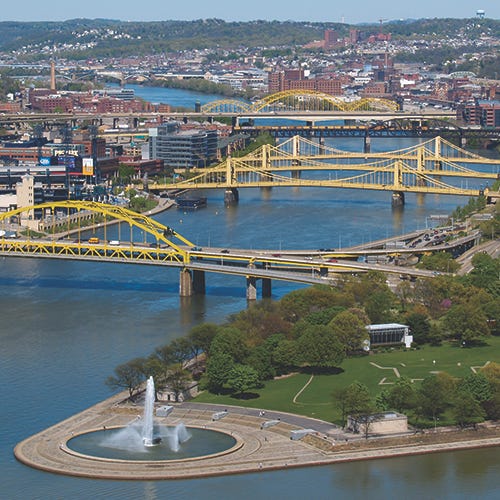
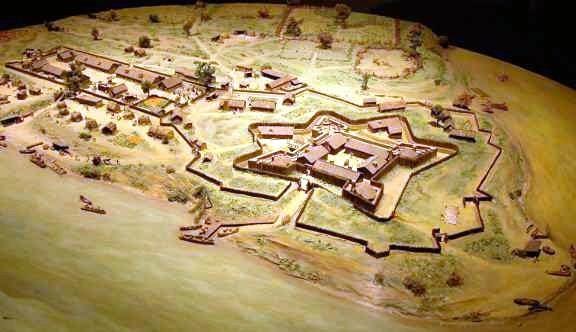
When safely at Fort Cumberland, Washington wrote his younger brother John Augustine Washington July 18, 1755, “By the All-Powerful Dispensations of Providence, I have been protected beyond all human probability or expectation; for I had four bullets through my coat, and two horses shot under me, yet escaped unhurt, although death was leveling my companions on every side of me!” Washington wrote the same to his mother Mary Ball Washington.
Once taught in history books, there is also a story of what the Indian chief at the battle said about that day when he later met Washington:
Our rifles were leveled, rifles which, but for you, knew not how to miss – `twas all in vain, a power mightier far than we, shielded you.” One warrior declared: “I had seventeen fair fires at him with my rifle and after all could not bring him to the ground! Seeing you were under the special guardianship of the Great Spirit, we immediately ceased to fire at you.”
He was a humble man who was tempted twice with absolute rule of America. The first when Congress had to flee Philadelphia and Washington was given absolute control like the Roman dictators, which he relinquished as soon as possible. He had the grace to refuse being crowned the king of the United States after he was victorious over the British. Washington was first horrified. Then furious and demanded the topic never be raised again. You would have to look long and hard among the mostly dishonorable crew in Washington DC to find one capable of such deeds if offered the same! When told that Washington was done with politics and going back to his plantation, a dumbfounded King George III of England proclaimed him "the greatest character of the age."
His integrity was pure, his justice the most inflexible I have ever known, no motives of interest or consanguinity, of friendship or hatred, being able to bias his decision. He was, indeed, in every sense of the words, a wise, a good, and a great man. - Thomas Jefferson on George Washington
The vast powers of the presidency, as one Convention delegate wrote, would not have been made as great "had not many of the members cast their eyes towards General Washington as president; and shaped their ideas of the powers to be given to a president by their opinions of his virtue."
If George Washington was killed that day like most of the officers around him, it is improbable there would have been someone else to fill his shoes in all the things he accomplished.
The freak storm that caused the British retreat from Boston
After the battles of Lexington and Concorde on April 19, 1775, the British retreated to Boston and took control of the city. On May 10, 1775, Fort Ticonderoga in upstate New York was captured from the British who held it since 1759, by the Green Mountain Boys, a militia established in 1770. They were led by Colonel Ethan Allen, (not to be confused with making furniture), and Colonel Benedict Arnold, (yes, that Benedict Arnold.)
General Washington took control of the Continental Army in Boston and was determined to take it back from the British. Their lack of arms was the problem. Washington's young friend, 25 year old Colonel Henry Knox suggested going to Fort Ticonderoga to retrieve the captured British artillery. Washington agreed and on Nov. 17, 1775, a journey that came to be known as the Knox Expedition began. The distance over 300 miles through the snow covered mountains, across lake George and two rivers. Knox reached the fort on Dec. 5, 1775. At the fort, Knox took an assessment and loaded up 60 tons of cannons, mortars and howitzers, including several 24 pound cannons, referring to the size of cannonball they shot, known as "Big Berthas," which were 11 feet long and weighed 5,000 pounds. The return trip included almost sinking an overloaded ship on the trip from the northern end of Lake George to the southern end. Building 42 sleds pulled by 80 oxen to drag the cannons over the snow covered mountains and across two frozen rivers with some of the cannons falling through the ice and having to be retrieved. They finally made it to Boston on Jan. 27, 1776, on a journey supposed to take two weeks.
The most advantageous spot in Boston was Dorchester Heights. The British had not succeeded in using it as a vantage point.
When Knox returned with the weapons and ammunition, General Washington devised a plan. He first placed some of the heavy cannons from Ticonderoga at Lechmere's Point and Cobble Hill in Cambridge, and on Lamb's Dam in Roxbury. On the nights of March 2, 3 and 4th, the cannons at these locations shelled British locations. On the evening of March 4, with a plan devised by Rufus Putnam, a former millright, he fabricated fortified timber walls and the tools needed to get cannons and other equipment, such as barrels of gravel to be rolled downhill, moved to the top of Dorchester Heights and fortify it. 2500 troops under the command of General John Thomas quietly moved everything up the hill with hay bales placed between the path taken by the troops and the harbor in order to muffle any noise. Washington was there to encourage and remind them March 5 was the sixth anniversary of the Boston Massacre. By morning, they had the hill fortified and cannons in place. In the morning, the British saw what they had done and were astonished.
My God, these fellows have done more work in one night than I could make my army do in three months.
- British General Howe
With the commander of the British fleet, Admiral Shuldham, deciding the fleet in the harbor was in danger unless the Heights were taken, General Howe planned to take the hill on the evening of March 5th. Washington anticipating this, fortified the Heights with an additional 3,500 troops and planned a simultaneous attack on Cambridge. However, the weather had other plans.
The weather was unusually warm on the 4th. By the evening of the 5th, a severe storm with snow and sleet started, accompanied by hurricane force winds that broke windows and destroyed property. Comments from troops and Boston residents were they had never seen such a severe storm. By morning, the snow and sleet changed to driving rain on the frozen ground, making it impossible for the British to move up the hill. The storm lasted for days. By March 8, General Howe sent a message to Washington that the British would not burn the city if they were allowed to leave peacefully. Washington agreed, but with the storms continuing, it took till March 17, 1776 for the British to finally leave Boston.
The storm and fog which enabled Washington to escape from Long Island
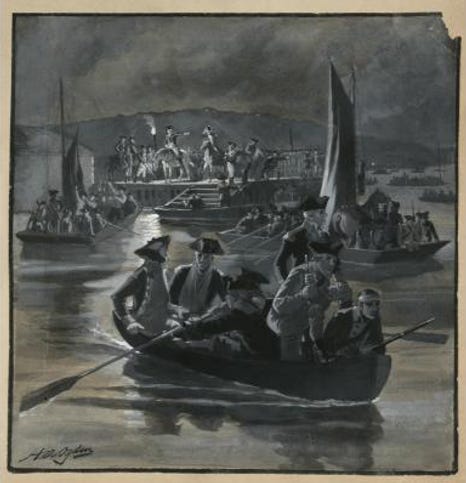
In the summer of 1776, General Howe had a British force of more than 400 ships and 32,000 troops stationed around Staten Island in New York Harbor. On August 27, 1776, the great Battle of Long Island began. Washington had only 10,000 troops stationed around Brooklyn Heights on the western edge of Long Island. Howe was able to land 15,000 troops behind Washington's lines. They inflicted heavy casualties, surrounding them on three sides and had them pinned against the East River. A receding tide, strong winds and pouring rain kept the British from moving ships up the East River to block Washington and his troops from escaping. By August 29, about 11 PM, the wind died and a thick fog rose. General John Glover and the Marblehead Mariners in their Durham boats quietly got Washington and his troops to Manhattan. When the fog lifted the next morning, the British were shocked to find Washington and his troops had vanished.
The miraculous crossing at Valley Forge
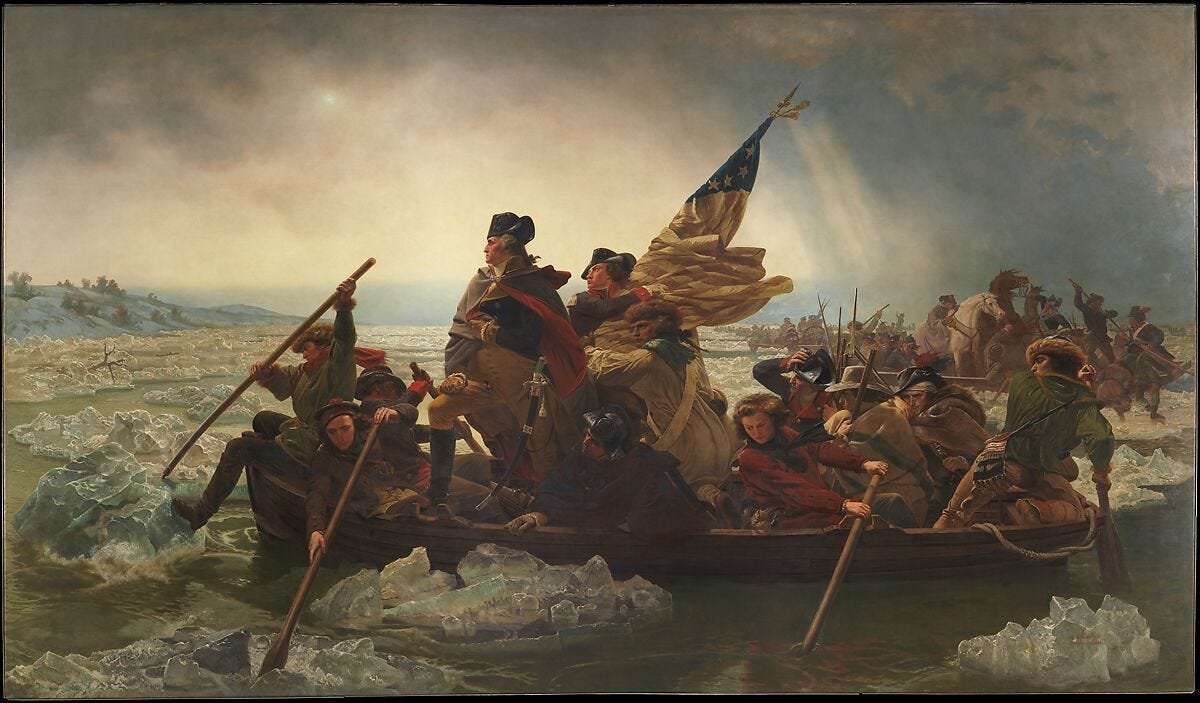
A massive storm hit at 11PM on Christmas Eve 1776. General John Glover and the Marblehead Mariners in their Durham boats miraculously transported Washington, the bulk of his army, their horses and cannons across the semi- frozen Delaware River in the middle of a raging storm, which dragged out the crossing, which should have taken an hour, from midnight till 4AM. They did not lose one man.
The Storm allowed a surprise attack of the Hessians at Trenton
Once they crossed the Delaware, Washington immediately had to start the 9 1/2-mile march to Trenton to make it by morning. The troops were exhausted, and many froze to death.
Not wanting to lose any more of his troops, Washington shouted encouragement to the men: “Soldiers, keep by your officers. For God’s sake, keep by your officers!” Throughout the night, the commander in chief remained determined; adversity brought forth his best qualities. “Press on! Press on, boys!” he shouted as he rode up and down the line.
Contrary to a historical myth, the Hessians in Trenton were not drunk or idle. Their experienced commander, Colonel Johann Rall, the hero of White Plains Chatterton’s Hill and the breakthrough at Fort Washington, kept his men in constant readiness and on patrol. A series of raids by the local militia in the prior days had put them on edge, and the men slept dressed and armed.
Washington and his troops got to Trenton shortly before 8 a.m. and got within 200 yards because of poor visibility from the storm before the Hessians saw them. They attacked, captured the Hessian artillery and quickly overran the city, putting snipers in place to pick off the Hessians. Their commander, Colonel Johann Rall, was mortally wounded, and his troops tried to escape. Washington led his troops on horseback in pursuit shouting, “March on, my brave fellows, after me!” Hit from three sides, the Hessians, now leaderless, lowered their guns and their flags around 9:00 a.m.
The Continental army killed 22 Hessians, severely wounded 84, while taking 896 prisoners, with few losses of their own. They captured “as many muskets, bayonets, cartouche boxes and swords,” as well as the artillery, increasing their supplies. A GREAT victory that turned the tide of the war.
Washington's escape from Trenton and victory at Princeton
After the American victory at Trenton over the Hessians, General Cornwallis was sent to engage them. They had crossed back over the Delaware River and were deployed around Trenton. The roads were muddy due to an early thaw. Cornwallis had Washington and his men pinned against a creek. Cornwallis postponed his attack and decided to “bag the fox” the next day. Overnight, the temperature fell and froze the roads. Washington and his men left their campfires burning and slipped away from Cornwallis to Princeton where they attacked and defeated other British troops cutting off Cornwallis' supply line.
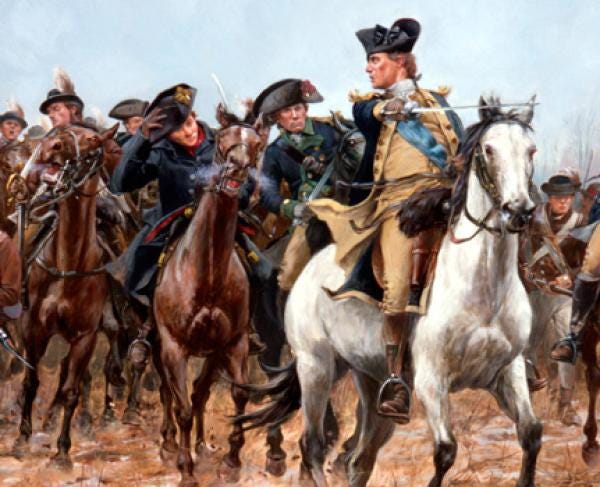
Not convinced yet? There are more “unexplainable coincidences” in part 2
No people can be bound to acknowledge and adore the Invisible Hand which conducts the affairs of men more than the people of the United States. Every step by which they have advanced to the character of an independent nation seems to have been distinguished by some token of providential agency . . . We ought to be no less persuaded that the propitious smiles of Heaven can never be expected on a nation that disregards the eternal rules of order and right which Heaven itself has ordained.
- President George Washington from his First Inaugural Address








and it will be again during this next historical event..
And yet we have so many thoroughly corrupt people running both this country and the rest of the world, intent on destroying everything that George Washington had a hand in building.